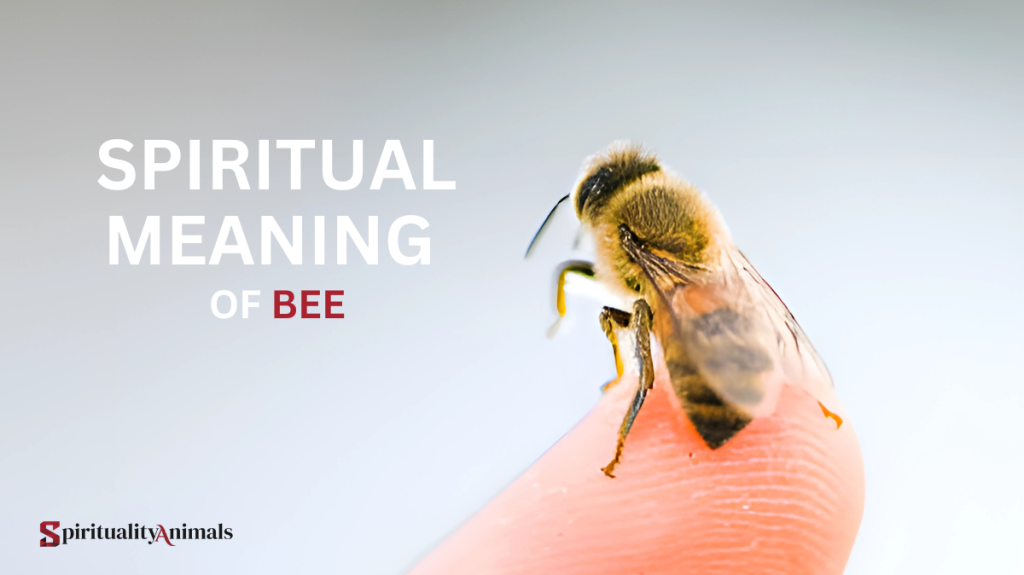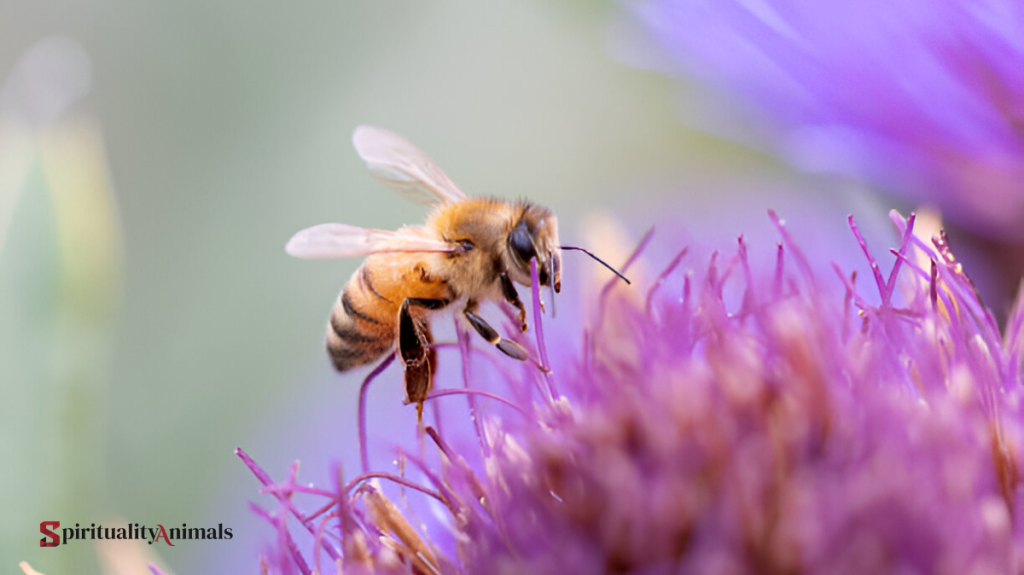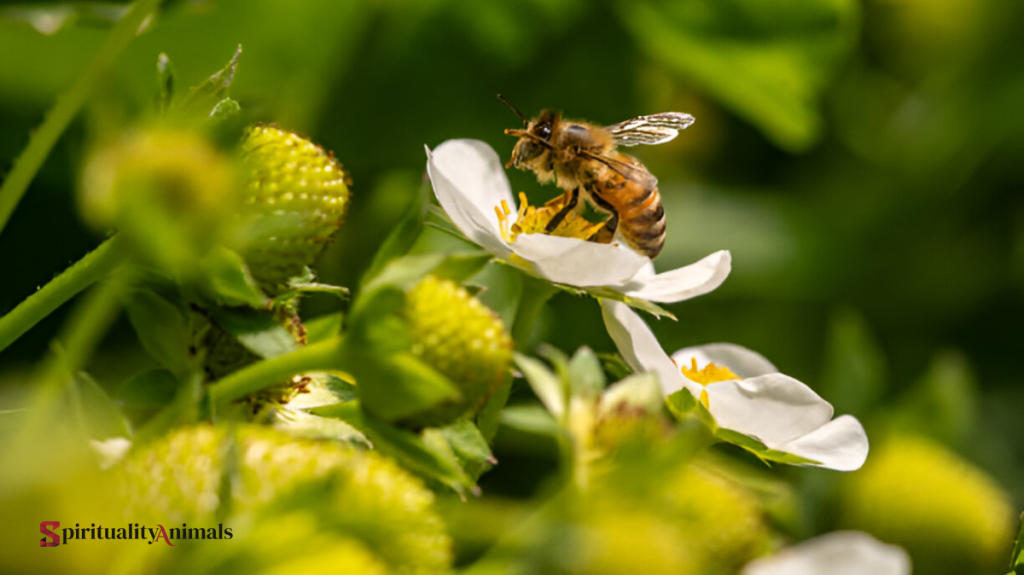Have you ever watched bees buzzing from flower to flower? These tiny creatures do more than make honey. In many cultures around the world, bees have special meanings.
They show up in stories, art, and beliefs that go back thousands of years. We will explore what bees mean in spiritual traditions and what we can learn from them.

Contents
- 1 Brief Answer on Spiritual Meaning of Bee
- 2 Overview of Bee Symbolism
- 3 Importance of Bee in Spirituality
- 4 Meaning and Messages of the Bee
- 5 Types of Bee and their Meaning
- 6 Historical Context of the Bee
- 7 Spiritual Signs from Bees
- 8 Spiritual Characteristics of the Bee
- 9 Symbolism of Bees in Different Cultures
- 10 Positive Traits of the Bee
- 11 Negative Traits of the Bee
- 12 Lessons We Can Learn from Bees
- 13 The Bee as a Power Animal
- 14 Christianity Symbolism of the Bee
- 15 Totem or Spirit Animals: The Bee
- 16 Dream Interpretation: What Does Dreaming of Bees Mean?
- 17 Bee in Mythology and Folklore
- 18 Bee Tattoos and Their Meanings
- 19 Conclusion
- 20 Frequently Asked Questions
Brief Answer on Spiritual Meaning of Bee
The primary spiritual meaning of a bee revolves around diligence, community, and prosperity. These industrious insects are seen as powerful symbols of hard work, collaboration, and the sweet rewards that come from dedicated effort.
Their tireless pollination and creation of honey also represent abundance, fertility, and the interconnectedness of life. Furthermore, in many traditions, bees are considered divine messengers, bridging the gap between the physical and spiritual worlds.
Overview of Bee Symbolism
Bees are small but mighty creatures that appear in stories and beliefs across the world. When we talk about bee symbolism, we’re looking at what these insects represent to different people.
Some common meanings include hard work, teamwork, sweetness, and community. Bees work together in amazing ways that have inspired humans throughout history.
Importance of Bee in Spirituality
In spiritual beliefs, bees hold a special place. Many traditions see bees as messengers between our world and the spirit world.
Their buzzing is sometimes thought to be the voice of the gods or ancestors. Bees create honey, which many cultures view as a sacred food that connects heaven and earth.
Meaning and Messages of the Bee
What Does the Bee Represent Spiritually?
Spiritually, bees represent many positive qualities. They stand for:
- Productivity: Bees are always working to create something useful.
- Community: They live and work together for the good of all.
- Sweetness: The honey they make reminds us of life’s rewards after hard work.
- Connection: As they move from flower to flower, bees connect different parts of nature.
- Resurrection: In some traditions, bees symbolize life after death because they seem to “come back to life” after winter.
What Can Bees Teach Us?
Bees have many lessons for humans. They teach us to work hard but also to work smart. A bee colony shows how individuals can work together for a greater purpose.
Bees also teach balance – they work hard but also know when to rest. They remind us that small actions, when done consistently, can create amazing results.
Types of Bee and their Meaning
Bumblebee
Bumblebees are round and fuzzy with a gentle nature. They represent comfort, warmth, and persistence. They can fly even when science suggests they shouldn’t be able to – teaching us to overcome limitations.
Honey bee
The honey bee is perhaps the most familiar type. These bees represent sweetness, reward, and the fruits of labor. They remind us that our work should create something good for ourselves and others.
Carpenter bee
Carpenter bees build homes in wood. They symbolize building, creation, and establishing foundations. They teach us about making our mark on the world.
Stingless bee
These gentle bees make honey without the defensive sting. They represent kindness, peaceful work, and creating good without harm.
Meganomiinae
These rare bees are found in Africa. They symbolize uniqueness and hidden treasures. They remind us that some spiritual gifts are rare and special.
Apidae
This large family of bees includes many types. They represent diversity within community – showing how different individuals can work together.
Stenotritidae
Found only in Australia, these bees represent unique paths and special purposes. They teach us that some spiritual journeys are uniquely our own.
Andrena
These solitary bees are among the first to appear in spring. They symbolize new beginnings, rebirth, and the courage to start fresh.
Euglossa bazinga
This colorful orchid bee was named after a catchphrase from a TV show. It represents joy, playfulness, and finding the fun in hard work.
Historical Context of the Bee
Ancient Egypt and Bees
In Ancient Egypt, bees were sacred creatures. The pharaohs used the bee as a symbol in their titles, showing they ruled over a productive and organized land.
Honey was used in medicine and religious ceremonies. Egyptians believed bees were born from the tears of the sun god Ra, making them divine messengers.
Bees in Greek Mythology
Greek myths tell of bees feeding baby Zeus, the king of gods, with honey when he was hidden from his father.
The priestesses at Delphi, who told the future, were called “Melissae” which means “bees.” Greeks believed bees had special wisdom and could connect humans with the gods.

Spiritual Signs from Bees
How to Recognize a Spiritual Sign from a Bee
Many people believe bees can bring spiritual messages. If a bee lands on you and doesn’t sting, some see this as a blessing or sign of good luck. A bee entering your home might be seen as a message to focus on creating sweetness in your life.
Seeing bees when thinking about a question might offer guidance. The key is paying attention to when and how bees appear in your life.
Bee as a Sign of Community
When bees appear in unusual numbers or places, some believe it’s a reminder about the importance of community. This sign might come when you need to connect more with others or contribute to your group. It reminds us we aren’t meant to live alone but to support each other.
Spiritual Characteristics of the Bee
Hardworking and Focused
Bees are famous for their work ethic. They focus completely on their tasks without getting distracted. In spiritual traditions, this teaches us the power of concentration and dedication. Like the bee, we can accomplish amazing things when we put our full attention on our goals.
Community-Oriented
A bee’s life is all about serving its community. In a hive, every bee has a job that helps the whole group survive.
This teaches us about sacrifice, cooperation, and finding our role in the larger community. Spiritual traditions often point to bees as examples of putting the group’s needs alongside individual needs.
Symbolism of Bees in Different Cultures
Bees in Western Culture
In Western traditions, bees often symbolize industry, hard work, and community. European folklore says that bees must be told about major family events like births and deaths, or they might leave.
Bees appear in Christian art representing the sweet words of Christ. In modern times, bees have become symbols of environmental awareness and protection.
Bees in Eastern Culture
In Chinese culture, bees represent hard work and good luck. The Chinese word for bee sounds like the word for “wealth,” creating a connection between bees and prosperity.
In Hindu traditions, the god of love, Kama, has a bow with a string made of bees, showing the sweet but sometimes painful nature of love.
Positive Traits of the Bee
Hardworking and Determined
Bees are tireless workers. A single bee might visit 100 flowers in one trip from the hive. This determination shows us how to keep going even when tasks seem large.
Bees work from sunrise to sunset when weather permits, teaching us about making the most of our time.
Cooperation and Teamwork
The way bees work together is amazing. They communicate through dances to show others where to find flowers.
Different bees have different jobs – some gather pollen, others care for young, some build the honeycomb, and others guard the hive. This teaches us how specialized roles can make a community stronger.
Negative Traits of the Bee
Overworking and Stress
While bees’ work ethic is impressive, it also holds a warning. Worker bees literally work themselves to death, with their wings wearing out after about 500 miles of flight. This reminds us to find balance and not sacrifice our well-being for endless work.
Aggression When Threatened
Bees are peaceful unless they feel their home is in danger. Then they will sting to protect the hive, even though stinging costs them their lives. This teaches us about appropriate boundaries and defense, but also warns against overreaction that might hurt ourselves more than help.
Lessons We Can Learn from Bees
Balance Between Work and Rest
Bees work hard when conditions are right, but they also rest when needed. During winter or bad weather, they stay in the hive. This teaches us to work with natural cycles of energy and rest, rather than pushing ourselves constantly.
Importance of Teamwork
A single bee makes only about 1/12 of a teaspoon of honey in its lifetime. But together, a hive can produce pounds of honey. This shows how small contributions add up when everyone works toward a common goal. It reminds us that our small efforts matter when joined with others.
The Bee as a Power Animal
What is a Power Animal?
A power animal is a spiritual helper in the form of an animal that offers guidance and protection. This idea comes from shamanic traditions where animals bring specific energies and lessons to help people on their life journey.
How the Bee Can Help You
As a power animal, the bee brings energy for:
- Getting projects done when you feel stuck
- Finding your place in a group
- Creating sweetness and joy in your life
- Speaking your truth with kindness
- Building something lasting through small, consistent efforts
People who connect with bee energy often find themselves more productive and better at working with others.

Christianity Symbolism of the Bee
Bees as Symbols of Industry and Community in Christianity
In Christian art and writings, bees represent an ideal Christian community. Monasteries were often compared to beehives, with monks working together in harmony.
Saint Ambrose, whose name relates to “ambrosia” (a word for honey), was said to have had bees land on his mouth as a baby, foretelling his sweet and wise speaking.
Bees and the Kingdom of Heaven
Jesus compared the Kingdom of Heaven to many things in nature, and while not directly mentioning bees, the orderly, productive community of bees matches many descriptions of heaven.
Some Christian writers see the bee’s making of honey as similar to how Christians should produce “sweetness” in the world through good deeds.
Totem or Spirit Animals: The Bee
What Does the Bee Totem Mean?
If the bee is your totem animal, you likely have a natural ability to work hard and create things of value. Bee people tend to be social, productive, and focused on building community. They often find themselves taking leadership roles or bringing people together for common causes.
The Bee’s Wisdom
Bee wisdom teaches us to:
- Create something sweet from simple ingredients
- Work with others toward shared goals
- Protect what matters most
- Find the “nectar” or goodness in each situation
- Communicate clearly and honestly
Dream Interpretation: What Does Dreaming of Bees Mean?
Dreaming of Bees: What Are the Messages?
Dreams about bees often relate to productivity, community, or rewards coming from hard work. Seeing happy, working bees might suggest your efforts will soon pay off.
Many bees working together could reflect your feelings about your community or workplace. Bees making honey might represent creating something valuable in your life.
Dreaming of a Bee Sting
Dreaming of being stung by a bee might indicate you feel hurt by someone’s words or actions. It could also suggest you need better boundaries. Sometimes this dream points to a truth that might be painful but necessary to hear.
Bee in Mythology and Folklore
Bees in Greek and Roman Folklore
In Greek and Roman stories, bees were thought to be born from the carcasses of bulls or oxen, a process called “bugonia.”
This strange belief connected bees with rebirth and transformation. The Roman writer Virgil described this process and wrote extensively about beekeeping, showing the cultural importance of bees.
Celtic Folklore and Bees
Celtic traditions viewed bees as messengers between worlds. Bees were treated with great respect, and it was considered bad luck to kill one.
The Celts believed bees carried messages to the spirit world, which is why the custom of “telling the bees” about family events became important in areas with Celtic influence.
Bee Tattoos and Their Meanings
Why People Get Bee Tattoos
People choose bee tattoos for many reasons. Some want to remember the importance of hard work and community. Others choose it as a symbol of sweetness and creating good things in life.
Environmental activists might get a bee tattoo to show support for protecting these important pollinators.
Meaning of Bee Tattoos
A bee tattoo can represent:
- Productivity and hard work
- Being part of something bigger than yourself
- Environmental awareness
- Sweetness and reward
- Overcoming challenges (as bees supposedly shouldn’t be able to fly but do)
The placement and design of the bee can add to its meaning, with flying bees suggesting freedom and progress.
Conclusion
The spiritual meaning of bees touches on universal human values – hard work, community, creating something sweet from our efforts, and finding our place in the larger world.
Across cultures and throughout history, these small creatures have carried big messages about how to live well.
By paying attention to the humble bee, we might find guidance for creating more productive, balanced, and sweet lives.
Frequently Asked Questions
What does it mean spiritually when a bee lands on you?
Many believe this is a sign of good luck or blessing. It might mean you’re being recognized for your hard work or that sweetness is coming into your life.
Are bees considered good luck?
Yes, in many cultures bees are considered very lucky, especially if they build a hive near your home. This is thought to bring prosperity and happiness.
What does the Bible say about bees?
While bees aren’t mentioned often in the Bible, honey is frequently described as something good and desirable. The Promised Land is described as “flowing with milk and honey,” showing the value placed on what bees produce.
Why are bees associated with royalty?
In Ancient Egypt, the bee was a symbol of Lower Egypt, and pharaohs used the title “Bee King.” The organized structure of the hive with the queen bee at its center created natural associations with royal authority and good governance.
Can bees be spirit guides?
In many spiritual traditions, any animal can serve as a spirit guide. People who feel connected to bee energy might receive guidance related to productivity, community building, and creating sweetness in life.
Disclaimer: At SpiritualityAnimals, we share spiritual and symbolic interpretations based on traditional wisdom and personal insights. Our content is purely informational and should not replace professional guidance.
